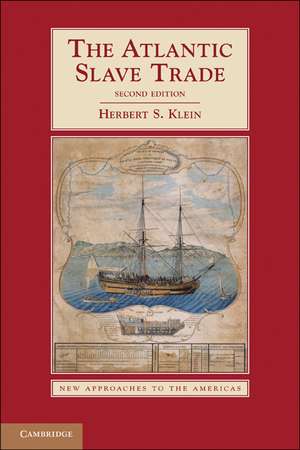The Atlantic Slave Trade: New Approaches to the Americas
Autor Herbert S. Kleinen Limba Engleză Paperback – 25 apr 2010
| Toate formatele și edițiile | Preț | Express |
|---|---|---|
| Paperback (1) | 158.77 lei 3-5 săpt. | |
| Cambridge University Press – 25 apr 2010 | 158.77 lei 3-5 săpt. | |
| Hardback (1) | 569.64 lei 6-8 săpt. | |
| Cambridge University Press – 25 apr 2010 | 569.64 lei 6-8 săpt. |
Preț: 158.77 lei
Nou
Puncte Express: 238
Preț estimativ în valută:
30.38€ • 32.99$ • 25.52£
30.38€ • 32.99$ • 25.52£
Carte disponibilă
Livrare economică 01-15 aprilie
Preluare comenzi: 021 569.72.76
Specificații
ISBN-13: 9780521182508
ISBN-10: 0521182506
Pagini: 264
Ilustrații: 14 b/w illus. 4 maps 8 tables
Dimensiuni: 162 x 228 x 16 mm
Greutate: 0.36 kg
Ediția:Revizuită
Editura: Cambridge University Press
Colecția Cambridge University Press
Seria New Approaches to the Americas
Locul publicării:New York, United States
ISBN-10: 0521182506
Pagini: 264
Ilustrații: 14 b/w illus. 4 maps 8 tables
Dimensiuni: 162 x 228 x 16 mm
Greutate: 0.36 kg
Ediția:Revizuită
Editura: Cambridge University Press
Colecția Cambridge University Press
Seria New Approaches to the Americas
Locul publicării:New York, United States
Cuprins
Introduction; 1. Slavery in Western development; 2. American labor demand; 3. Africa at the time of the Atlantic slave trade; 4. The European organization of the slave trade; 5. The African organization of the slave trade; 6. The middle passage; 7. Social and cultural impact of the slave trade on America; 8. The end of the slave trade; Appendix tables; Bibliographic essay.
Recenzii
“Klein is especially adept at using statistical studies to shed light on social and cultural history. . . . This is a concise and thoughtful synthesis of interdisciplinary history.” – Journal of Interdisciplinary History
“This book would make an excellent text for a course on the Atlantic slave trade and will be quite useful as supplementary reading for any course that has a significant component of African or African-American history during the height of the trade. It will also serve well the scholarly public desiring the latest accessible information on this important but controversial topic.” – Richard Steckel, Journal of Economic Literature
“[This book] provides a convenient account of the complex history and extensive historiography of one of the most important and pervasive human activities of the past 500 years. In this short but important book, Herbert Klein sets out to examine the nature and importance of the trade and the reasons for its dissolution.” – The Historian
“This is the best introduction to the Atlantic slave trade currently available. Crisply written, it combines a masterful survey of the latest scholarship with carefully balanced geographical coverage. . . . Klein has set a standard that will be hard to beat.” – David Northrup, Canadian Journal of African Studies
“The Atlantic Slave Trade is a brilliant work of synthesis. . . . this is a hugely impressive book that will be essential reading for all students of slavery and the Atlantic slave trade.” – J. R. Oldfield, The English Historical Review
“This timely book synthesizes the wealth of new information that has emerged in recent decades on the Atlantic slave trade . . . . This book would make an excellent text for a course on the Atlantic slave trade and will be quite useful as supplementary reading for any course that has a significant component of African or African-American history during the height of the trade. It will also serve well the scholarly public desiring the latest accessible information on this important but controversial topic.” – Richard H. Steckel, Journal of Economic Literature
“The book is a masterpiece of economic history, and as long as Klein is presenting economic arguments, he is unmatched. The chapters on the business organization of the slave trade, especially its European end, the disposition of slaves in the Americas, and the Middle Passage are finely tuned, clearly written, and deploy the latest scholarship. Indeed, in making generalizations, Klein goes beyond what can be learned simply by consulting the latest scholarship. The international dimension of the trade, the multiplicity of nationalities involved, and its huge intercontinental scope are easily grasped by an approach in which Klein is as comfortable with the operations of the Dutch and Danish shippers as he is with the English. Indeed, one of Klein's strong suits is that he does not simply generalize from the English trade, but is sensitive to the nuances of the trade from all shippers and consumers.” – John Thornton, The International History Review
"...updated and greatly expanded quantitative data set on the involvement of Portuguese and Spanish ships in the Atlantic trade strengthens his already compelling arguments about the importance of the South Atlantic to this enterprise." -Sandra E. Greene, African Studies Review
“This book would make an excellent text for a course on the Atlantic slave trade and will be quite useful as supplementary reading for any course that has a significant component of African or African-American history during the height of the trade. It will also serve well the scholarly public desiring the latest accessible information on this important but controversial topic.” – Richard Steckel, Journal of Economic Literature
“[This book] provides a convenient account of the complex history and extensive historiography of one of the most important and pervasive human activities of the past 500 years. In this short but important book, Herbert Klein sets out to examine the nature and importance of the trade and the reasons for its dissolution.” – The Historian
“This is the best introduction to the Atlantic slave trade currently available. Crisply written, it combines a masterful survey of the latest scholarship with carefully balanced geographical coverage. . . . Klein has set a standard that will be hard to beat.” – David Northrup, Canadian Journal of African Studies
“The Atlantic Slave Trade is a brilliant work of synthesis. . . . this is a hugely impressive book that will be essential reading for all students of slavery and the Atlantic slave trade.” – J. R. Oldfield, The English Historical Review
“This timely book synthesizes the wealth of new information that has emerged in recent decades on the Atlantic slave trade . . . . This book would make an excellent text for a course on the Atlantic slave trade and will be quite useful as supplementary reading for any course that has a significant component of African or African-American history during the height of the trade. It will also serve well the scholarly public desiring the latest accessible information on this important but controversial topic.” – Richard H. Steckel, Journal of Economic Literature
“The book is a masterpiece of economic history, and as long as Klein is presenting economic arguments, he is unmatched. The chapters on the business organization of the slave trade, especially its European end, the disposition of slaves in the Americas, and the Middle Passage are finely tuned, clearly written, and deploy the latest scholarship. Indeed, in making generalizations, Klein goes beyond what can be learned simply by consulting the latest scholarship. The international dimension of the trade, the multiplicity of nationalities involved, and its huge intercontinental scope are easily grasped by an approach in which Klein is as comfortable with the operations of the Dutch and Danish shippers as he is with the English. Indeed, one of Klein's strong suits is that he does not simply generalize from the English trade, but is sensitive to the nuances of the trade from all shippers and consumers.” – John Thornton, The International History Review
"...updated and greatly expanded quantitative data set on the involvement of Portuguese and Spanish ships in the Atlantic trade strengthens his already compelling arguments about the importance of the South Atlantic to this enterprise." -Sandra E. Greene, African Studies Review
Notă biografică
Descriere
The Atlantic Slave Trade examines the four hundred years of Atlantic slave trade.



























